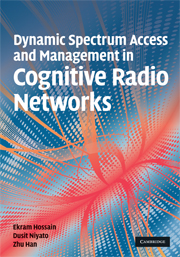Book contents
- Frontmatter
- Contents
- Preface
- Part I Introduction
- Part II Techniques for design, analysis, and optimization of dynamic spectrum access and management
- Part III Dynamic spectrum access and management
- 7 Dynamic spectrum access: models, architectures, and control
- 8 Centralized dynamic spectrum access
- 9 Distributed dynamic spectrum access: cooperative and non-cooperative approaches
- 10 Distributed dynamic spectrum access: learning algorithms and protocols
- 11 Economics of dynamic spectrum access: spectrum trading
- 12 Economics of dynamic spectrum access: applications of spectrum trading models
- References
- Index
9 - Distributed dynamic spectrum access: cooperative and non-cooperative approaches
from Part III - Dynamic spectrum access and management
Published online by Cambridge University Press: 26 February 2010
- Frontmatter
- Contents
- Preface
- Part I Introduction
- Part II Techniques for design, analysis, and optimization of dynamic spectrum access and management
- Part III Dynamic spectrum access and management
- 7 Dynamic spectrum access: models, architectures, and control
- 8 Centralized dynamic spectrum access
- 9 Distributed dynamic spectrum access: cooperative and non-cooperative approaches
- 10 Distributed dynamic spectrum access: learning algorithms and protocols
- 11 Economics of dynamic spectrum access: spectrum trading
- 12 Economics of dynamic spectrum access: applications of spectrum trading models
- References
- Index
Summary
In many scenarios such as in ad hoc cognitive radio networks, deploying a central controller may not be feasible. Therefore, distributed dynamic spectrum access would be required in such cognitive radio networks. Due to the absence of any central controller, each unlicensed user has to gather, exchange, and process the information about the wireless environment independently. Also, an unlicensed user has to make decisions autonomously based on the available information to access the spectrum, so that the unlicensed user can achieve its performance objective under interference constraints. The common behaviors of an unlicensed user in a cognitive radio network without a central controller are as follows:
• Cooperative or non-cooperative behavior: Since a central controller which controls a decision of spectrum sharing is not available, an unlicensed user can adopt either cooperative or non-cooperative behavior. An unlicensed user with cooperative behavior will make a decision on spectrum access to achieve a network-wide objective (i.e. a group objective), even though this decision may not result in the highest individual benefit for each unlicensed user. In other words, an unlicensed user is concerned more about the overall performance of the network than its individual performance. On the other hand, an unlicensed user with non-cooperative behavior will make a decision only to maximize its own benefits (i.e. an individual objective). In this case, the unlicensed user will not be aware of the effect on the overall network performance.
[…]
Information
- Type
- Chapter
- Information
- Publisher: Cambridge University PressPrint publication year: 2009
